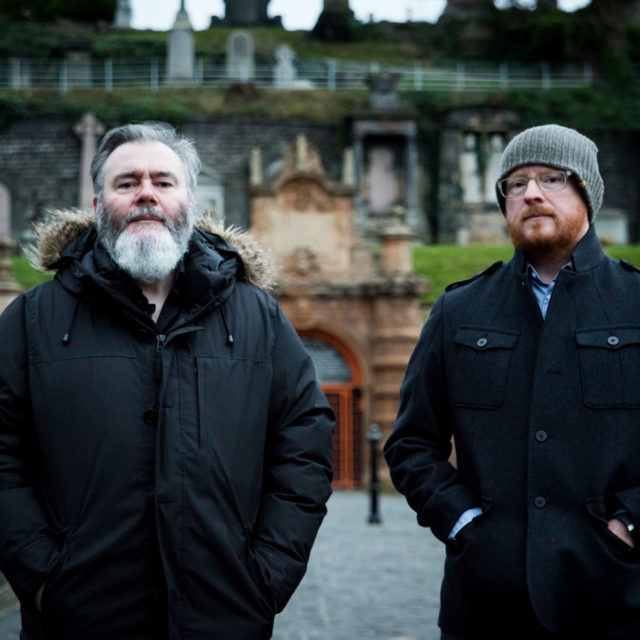ARAB STRAP

“It’s about hopelessness and darkness,” says Aidan Moffat. “But in a fun way.” The Arab Strap frontman is speaking about the band’s 7th studio album and their first since 2005’s The Last Romance.
The pioneering Falkirk duo of Moffat and Malcolm Middleton called it a day in 2006 but got back together 10 years later to perform a series of acclaimed and sold out shows. “We really enjoyed doing those gigs,” recalls Middleton. “So it made sense to try writing together again”.
Prior to splitting up the band released a string of acclaimed releases spanning albums such as Philophobia, The Red Thread and Monday At The Hug and Pint, several EPs and that most difficult of tasks: a genuinely stunning live album via Mad for Sadness.
Arab Strap started out as an intimate project with home-recorded tapes shared between friends, but after the unexpected success of their inimitable debut single ‘The First Big Weekend’ they quickly found themselves, along with pals Mogwai, as some of the most exciting and cherished music coming out of Scotland. The band’s first gig was recorded live for John Peel, who became an early devotee. The band went from indie record label Chemikal Underground onto the major label Go! Beat and then back again to Chemikal, touring the world and funnelling life’s experiences into a unique concoction of music that explored beauty, sadness, intoxicants, sex, love, and death all rolled into one.
Despite them being a pinnacle group of the era, Moffat makes it clear that the aim is not to “recapture the 90s” but instead to create a distinctly new album, with new tools, sounds and a forward moving sense of exploration. “This album feels like its own new thing to me,” he says. “It’s definitely Arab Strap, but an older and wiser one, and quite probably a better one.”
Across the 11 tracks, the band have tapped into their core sonic foundations and what made so many people fall for them but also stretched it out into new terrain. The deft mix of post-rock soundscapes, subtle electronics, clicking drum beats, swelling strings and Moffat’’s incomparable half-sung, half-spoken vocals are all present, but so too is a variety of new additions from blasts of woozy saxophone to disco grooves and a rich immersive production that plunges you deep into the stories. “We’ve had enough distance from our earlier work to reappraise and dissect the good and bad elements of what we did,” says Middleton. “Not many bands get to do this, so it’s great to split up.”
The album opens with ‘The Turning Of Our Bones’, a comically dark metaphor for the band’s own rebirth that Moffat describes as being about “resurrection and shagging”. Widely covered upon its release with countless radio plays, it’s an immediate addition to some of the band’s greatest work, unfurling via hypnotic beats, infectious grooves and spiralling guitar lines as Moffat skips between narrator and crooner. It sets the tone for an album that often plunges into dark territory, although this doesn’t necessarily manifest via stilted morbidity but simply by being rooted in nocturnal exploration. “The general theme of the album is what people turn to in times of need,” says Moffat. “And how they can hide in the night.”
However, despite the seeming bleakness of some subjects, the album marries the darker underbelly of life, and its lingering sense of hopelessness, with a quiet buoyancy, which coupled with the expansive sense of sonic experimentation results in something as introspective as it is enlivening. As Middleton told the Guardian when they profiled the band upon news of their return, “There’s no point getting back together to release mediocrity.”